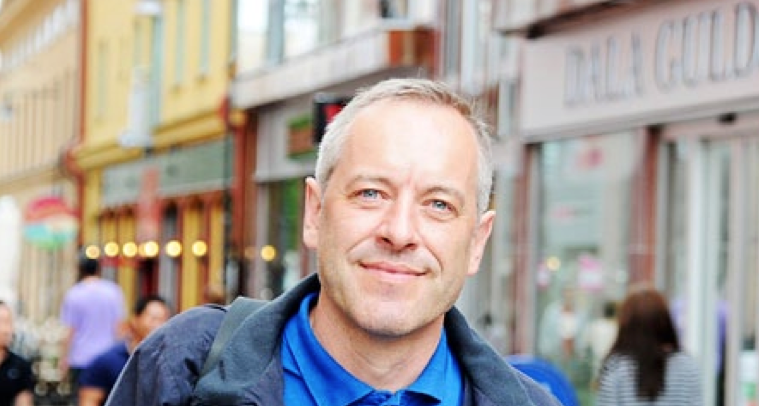US mid-terms: The ugly Beast and its unlikely Beauty
Democracy in America has seen better days ever since French political thinker Alexis de Tocqueville first visited the United States more than two centuries ago. It has turned into an ugly beast with too much money and too little participation. However, at the heart of it all you can still find unlikely beauties, writes Bruno Kaufmann, editor-in-chief of people2power.info.
Norwalk, California. The land that used to belong to Shoshone Indians, then to Spanish missionaries and, just a few decades ago, to sugar beet farmers has become a suburb, one of 88 cities in Los Angeles County. Here thousands of residents live in one-storey homes and spend hours shuttling back and forth to work and school, gridlocking the gigantic freeways that crisscross this municipality of 100,000 citizens.

While houses, gas stations and shopping malls look similar all over the less fashionable parts of southern California, one building stands out in the middle of Norwalk. It is the LA Registry, a yellow eight-storey cube, where the official records of over ten million people are kept.
“From here we can see helicopters flying the ballots in on election night,” explained county clerk Dean Logan, sitting in a top-floor office which has great views of downtown LA and the nearby Hollywood hills.
As chairman of the Election Commission in the biggest US county, Logan oversees the most comprehensive and complex electoral administrative unit in the country, with around five million registered voters.
“We have a great challenge to reach out to a lot of people who have no idea why they should and need to register before the election,” said Logan, who then gave some really discouraging statistics.
“At the last election in June we had a turnout of less than 20% of the registered voters.”
As a consequence, just over 5% of all citizens in the city of LA backed the 42nd Mayor of LA, Eric Garetti.
The small numbers of registered and participating voters contrast with the extensive decision-making possibilities citizens have in this part of the world, however.
“This Tuesday I can make almost 50 decisions, including national, state-wide and local offices, as well as many votes on substantive issues,” said Bob Stern, a retired election expert from Sacramento now living at Santa Monica in northern LA.
Across the United States on Tuesday citizens will decide on no less than 36 Senate and 435 House of Representative seats, 87 state legislative chambers, 146 state-wide referendums and several thousand local offices and referendums – bringing the total sum of individual ballot decisions into the billions.
With such a huge amount of formal people power, the context of all these decisions and the formal setup of the electoral administration are critical. Unfortunately, the situation remains a mess, as many so-called ‘races’ (elections for offices and special issues) are swamped by millions of dollars from just a handful of super-rich donors. These include people like the Koch brothers from Kansas, who are pursuing their ultra-conservative agenda across America. The unlimited opportunities to use private funds, something the US Supreme Court views as an “expression of free speech”, has forced less-affluent campaigns to also focus on fundraising instead of using the time ahead of an election to discuss, convince and deliberate.
“It has become very hard to make your voice heard,” said Pete Peterson, the Republican candidate for the office of Secretary of State in California. This is the person who manages and oversees electoral democracy in the most populated US state of 38 million people. But in California it is the Democratic Party that completely dominates. So even if Peterson – a civic education professor – is the best candidate for this important position, he has little chance of winning because he lacks funds.
People like Peterson would need to get into key positions to break American democracy’s vicious circle – too much money, too much fighting and too little trust in the democratic process.
Luckily not everything is politicized in the US when it comes to elections and participation. LA County City Clerk Dean Logan holds an appointed position, where partisanship plays no role. Here, skills and commitment are the key factors.
And in places like Norwalk, if you look hard enough you can find some real democratic ‘beauties’.
“We really work hard to welcome citizens and voters,” said Logan, who presides over a team of over 1,000 election officials at the Norwalk HQ and over 22,000 poll workers across the county.
“In the next few years we will need to renew and refresh all aspects of participatory democracy in order to bridge the current gaps between the many outsiders and the few insiders.”
As chairman of California’s “Future of Democracy” commission, Logan spearheads a programme to increase participation. This features voter outreach centres, citizen activation applications and electronic registration and voting projects.
Behind the tough headlines of conflict, manipulation and big money that has transformed Democracy America into an ugly beast in the eyes of many people, there are great opportunities ahead based on a long history of values linked to individual citizens, a well-established culture of modern direct democracy and institutions, which are often much better than their public image. This is where people like Dean Logan and his enthusiastic team are working to make democracy more open and accessible – and essentially much more democratic.
Opinion series
swissinfo.ch publishes op-ed articles by contributors writing on a wide range of topics – Swiss issues or those that impact Switzerland. Over time, the selection of articles will present a diversity of opinions designed to enrich the debate on the issues discussed.

In compliance with the JTI standards
More: SWI swissinfo.ch certified by the Journalism Trust Initiative









You can find an overview of ongoing debates with our journalists here . Please join us!
If you want to start a conversation about a topic raised in this article or want to report factual errors, email us at english@swissinfo.ch.